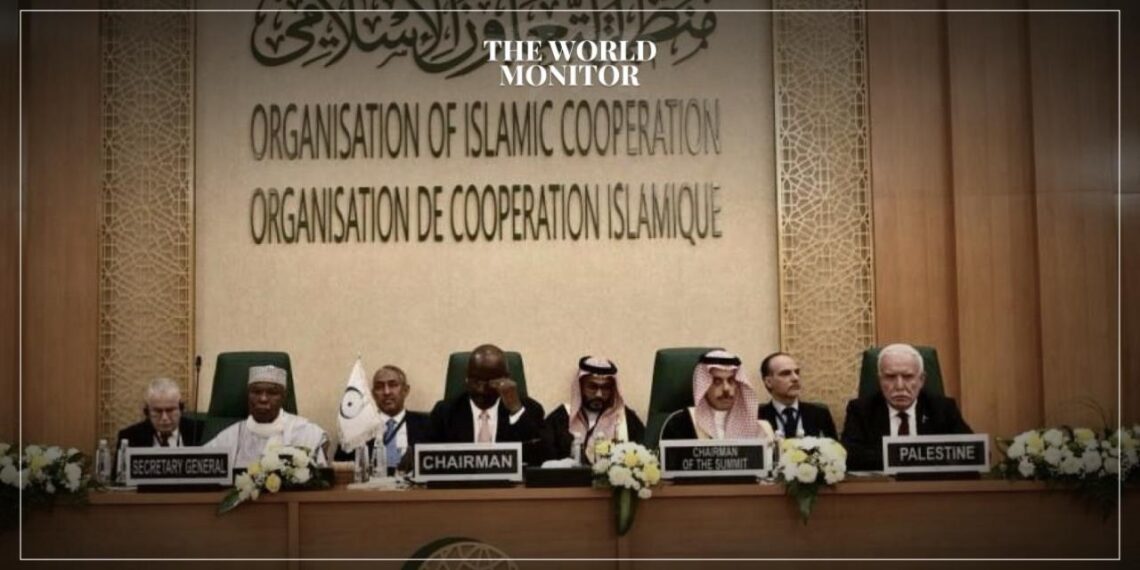The Council of Foreign Ministers of the Member States of the Organization of Islamic Cooperation, in their final statement from their extraordinary meeting in Jeddah on Tuesday night, reiterated the centrality of the Palestinian issue to the entire Islamic nation and the right of the Palestinian people to independence and the establishment of an independent and sovereign State of Palestine. They also affirmed their legitimate right to self-defense in the face of Israeli aggression targeting their lives, sanctities, and properties.
The Council condemned the positions of some countries that claim to respect human rights while continuing to support the ongoing brutal aggression against the unarmed Palestinian people, granting Israel immunity from punishment in violation of international law, including justifying the aggression and imposing sanctions on the Palestinian people and their institutions.
The Council called on all countries to take responsibility for providing humanitarian aid without obstacles and sufficiently, to adopt positions consistent with international law and the purposes and objectives of the United Nations Charter, and not to adopt any positions that discriminate against the victims of the Palestinian people or apply a double standard policy towards them.
The Council of Foreign Ministers of the Member States of the Organization of Islamic Cooperation called on the Prosecutor of the International Criminal Court to expedite the criminal investigation into war crimes and crimes against humanity committed and being committed by officials of the colonial occupation government against the unarmed Palestinian people and to bring the perpetrators to international justice.
The Council thanked South Africa, the Comoros, Djibouti, Bolivia, Bangladesh, Venezuela, Chile, and Mexico for referring the situation in the State of Palestine to the International Criminal Court
Moreover, the Council reiterated its call to member states to support efforts aimed at expanding the recognition of the State of Palestine and its full membership in the United Nations; this is seen as a fundamental step towards achieving a two-state solution based on the 1967 borders. The Council appreciates the initiatives undertaken by the Islamic Group in New York, which include drafting a document to gather support from countries for granting full membership to the State of Palestine and presenting it to the Secretary-General, the Security Council, and the General Assembly. It called for support for this Palestinian move at the highest levels and tasked the Islamic Group in New York to call for a General Assembly meeting on the recognition of the State of Palestine, and to submit a resolution at this meeting for the recognition of the State of Palestine as a full member of the United Nations. The Council urges countries that have not yet recognized the State of Palestine to do so as soon as possible. The Council rejects any infringement on the role of the United Nations Relief and Works Agency for Palestine Refugees (UNRWA), denounces all pressures and blackmail that the Agency faces, including the ongoing incitement campaign by the Israeli occupation government against UNRWA and its desire to eliminate its presence. It condemned some countries’ suspension of their financial support to the agency and demanded an immediate reversal of their stance and an increase in their financial support.
Through the statement, the Council affirmed its continued support for the role of the agency until the Palestinian refugee crisis is resolved through a fair and comprehensive solution that guarantees their right to return to their homes from which they were displaced and the recovery of their properties, in accordance with international legitimacy resolutions. In this regard, it emphasized the ongoing responsibility of the United Nations towards the Palestinian issue in all its aspects, including the issue of Palestinian refugees, and the centrality of continuing the work of the United Nations Relief and Works Agency for Palestine Refugees (UNRWA) in alleviating the plight of Palestinian refugees, helping to provide regional stability, and offering vital services to approximately 5.5 million Palestinian refugees.






